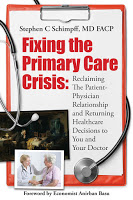We can’t afford a healthcare system giving everyone a ride to their doctors, nor one that doesn’t when it is critical for patient recovery.
We can’t afford a healthcare system giving everyone a ride to their doctors, nor one that doesn’t when it is critical for patient recovery.
Dr. Hanscom writes about a 78-year-old businessman in excellent physical condition that was suffering from lower back pain and pain down the side of his leg. The MRI scan revealed a bone spur pushing his fifth lumbar nerve root out to the side of his spine. The plan was to have spinal fusion surgery until Dr. Hanscom discovered his patient’s unmet recovery need. The patient’s son had recently passed away from a massive heart attack. Dr. Hanscom convinced his patient to delay the surgery. A month later, the patient reported having no pain in his back or down his leg. The surgery was not needed. He was fully active and had just rejoined a gym. He attributed the recovery to awareness of the links between anxiety, anger, trauma, and pain. He learned how to make sense of the different emotions he was trying to process.
What are “Unmet Recovery Needs”?
Unmet needs, that if left unaddressed, could delay or prevent patient recovery.
 When patients with multiple chronic conditions leave the Emergency Room or are discharged from the hospital, they are likely prescribed new medications. With 700,000 ER visits and 120,000 hospitalizations caused by adverse drug events, medication may have even been the source of the initial trip to the hospital. The patient may have been to multiple physicians (and ERs) and taking multiple medications. When asked by the physician, they may not remember each medicine they are taking nor the names on the labels. When they get home, they may be confused as to which medicines to take, which to discard, the instructions and when to contact their physicians if it’s making them ill or not working. One of the most common patient unmet recovery need is ensuring an optimal medication list, with no interactions and no instruction confusion. If this unmet recovery need is not addressed, the cycle that began with an ER visit may repeat.
When patients with multiple chronic conditions leave the Emergency Room or are discharged from the hospital, they are likely prescribed new medications. With 700,000 ER visits and 120,000 hospitalizations caused by adverse drug events, medication may have even been the source of the initial trip to the hospital. The patient may have been to multiple physicians (and ERs) and taking multiple medications. When asked by the physician, they may not remember each medicine they are taking nor the names on the labels. When they get home, they may be confused as to which medicines to take, which to discard, the instructions and when to contact their physicians if it’s making them ill or not working. One of the most common patient unmet recovery need is ensuring an optimal medication list, with no interactions and no instruction confusion. If this unmet recovery need is not addressed, the cycle that began with an ER visit may repeat.
An unmet recovery need could be the lack of transportation to a physician office. We can’t afford a healthcare system giving everyone a ride to their doctors, nor one that doesn’t when it is critical for patient recovery. Medicare and health plans typically do not reimburse for transportation unless it is one of those expensive ones in response to a 911 call. It would be hard to imagine the number of pages of regulation required for Medicare or insurers to determine who gets reimbursed for a ride. The medical record would need supporting justification for the ride and pass the scrutiny of Office of Inspector General audits. We may hope Medicare and health plans do not offer reimbursement for rides to physician offices, as our physicians already have enough paperwork.
Time to grieve, medicine confusion and transportation are unmet recovery needs that could delay or prevent patient recovery. For the 5% of the United States population that account for 50% of the total spending, an unmet recovery need may result in a patient being admitted to the hospital. Some unmet recovery needs can be addressed without a cost, like Dr. Hanscom recommending his patient to take time to grieve. Some require a cost that is not reimbursed by Medicare or health insurance like sending a pharmacist into a home or providing transportation.
Health plans, Accountable Care Organizations and organizations like the Camden Coalition have proven that addressing unmet recovery needs makes good economic sense even when they are not reimbursed for the cost. The Commonwealth Fund report “Addressing Patients’ Social Needs: An Emerging Business Case for Provider Investment” describes patient interventions as good investments.
Healthcare organizations are identifying high risk patients, getting to know them and coordinating their care including arranging Meals on Wheels deliveries. These “E Interventions” (see Healthcare Progress Depends On E Interventions) are reducing ER visits and hospital admissions as well as lowering the overall cost. These innovative organizations have discovered that we can no longer afford not to address unmet recovery needs. They are also figuring out how to pay for the associated interventions.
unmet recovery needs / shutterstock










